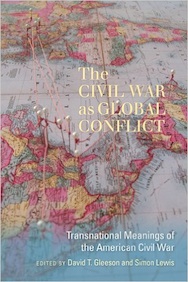By David Madden
In 1992, Congress passed a resolution supporting the creation of the United States Civil War Center at Louisiana State University, the mission of which was to study the war from the perspective of every conceivable academic discipline, profession, occupation, ethnic group, and women and children, and to facilitate the planning of the sesquicentennial of the war. In 1996, fifteen years before the sesquicentennial began, I testified as founding director of the Center in support of the creation of a national Civil War Sesquicentennial Commission patterned after the Centennial Commission. The Congress failed to act, LSU incrementally dismantled the U. S. Civil War Center, and the sesquicentennial ended in 2015 after four years of lackluster, unimaginative commemoration.
One of the most innovative books on the Civil War, Look to the Earth: Historical Archeology and the American Civil War, edited by Clarence Geier and Susan Winter, appeared in 1996 from the University of Tennessee Press. The Center helped develop and facilitated the publication at that press of a unique book, Ninety-eight Days: A Geographer’s View of the Vicksburg Campaign, by Warren Graybau, and two unusual books on the neglected work of engineers for the Confederacy and for the Union.
Now the University of South Carolina Press has the distinction of publishing one of the few innovative books of the sesquicentennial years, The Civil War as Global Conflict: Transnational Meanings of the American Civil War, edited by David T. Gleeson and Simon Lewis. This collection of thirteen solicited, previously unpublished essays by older well-established and young historians is also a major contribution to the relatively new and innovative Atlantic Studies discipline, and the first to examine the Civil War.
The array of subjects includes gender, race, ethnicity, the military, diplomacy, memory, and economics.
Professor of American History at Northumbria University in Newcastle upon Tyne, author of The Irish in the Atlantic World, David T. Gleeson deals with the problems for English immigrants in their efforts to prove their loyalty to the Republic during the American Civil War.
Professor of World Literature at the College of Charleston, author of books on slavery, and associate director of the Carolina Low Country and Atlantic World Program, with Gleeson, Simon Lewis does not contribute an essay, but with his co-editor Gleeson he is our reliable Virgil in the inferno of the Civil War, stressing, with McPherson, the demonstrable claim that “we cannot understand the impact of the war…. without thinking globally.”
Readers are likely eager to know what that venerable historian James McPherson has to say about “Two Irreconcilable Peoples? Ethnic Nationalism in the Confederacy.” He begins his answer to that question with the statement that “ethnic nationalism is one of the most powerful forces in the modern world. It broke up Yugoslavia into Slovenia, Croatia, Serbia, Bosnia, Montenegro, and Kosovo and caused sometimes deadly conflict among these ethnic nations. It shattered the Soviet Union….”
The essay that may stimulate the most thought is Edward B. Rugemer’s “Why Civil War? The Politics of Slavery in Comparative Perspective: The United States, Cuba, And Brazil,” which leads off the collection.
Some of the claims for the effects of the Civil War upon other nations and their effects upon the war, and other connections between the war and other nations are rather strained. While some of the essays in this new field may seem a little marginal, essays by Matthew Karp, Niels Eichhorn, and Christopher Wilkins are precisely on target.
Concluding with a panel of authorities who did not contribute essays in a discussion of memory, focused upon South Carolina, renders the collection rather lopsided.
While I would have preferred that the first book on the Civil War in the transnational context would express the complex vision of a single great mind, this thoughtful collection of insights smoothly paves the way.
David Madden is the author of five books on the Civil War, mostly recently The Tangled Web of the Civil War and Reconstruction: Readings and Writings from a Novelist’s Perspective (2015)




